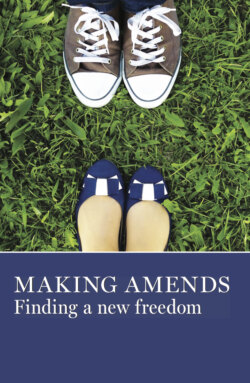Читать книгу Making Amends - Группа авторов - Страница 12
На сайте Литреса книга снята с продажи.
8 ½
ОглавлениеOctober 1986
As I continue to live each 24 hours in the Fellowship of Alcoholics Anonymous and attempt to practice its principles in all my affairs, one Step seems to play an increasingly important role in my life and in my relationships with others. This quiet but potent Step is Step Eight: “Made a list of all persons we had harmed, and became willing to make amends to them all.”
Many people, myself included, tend to lump Steps Eight and Nine together. By doing this, I never really achieved even a glimmer of the humility and love that Step Eight has to offer. Being a person of impatient actions, I was off and running on Step Nine with a simple list of names tightly grasped in my sweaty hand and a bad case of false humility to go along with it. Needless to say, I came home each evening with a battered sense of justice and my tail tucked underneath me.
As usual, I did not read all the words contained in the Step, and just as I had done in Step One, I read only the first half before jumping to the next Step. The resulting self-induced pain has, however, taught me much about myself and the principles of this simple program.
Going back to Step Eight, I read the words at last, “... became willing to make amends to them all.” As I began to absorb what was being said to me, and as I reviewed the first seven Steps leading up to this one, it suddenly became clear what the message was for me and what the hasty mistake of impatient interpretation had cost me in serenity. The word “identify” held the key to my success with this Step. To become willing means to become willing to identify myself in others. I had been using Step Eight not as preparation for Step Nine, which is the carrying out of that willingness, but as a hiding place for my own real fear of my true shortcomings. The purpose of Step Eight for me is not to hide but to identify. In order not to identify, I either condemned or forgave as if I were some kind of standard for comparison. In this Step I receive the humility to “identify,” to see myself in others and to share their burdens and difficulties by sharing myself. In this Step I truly join the human race. My identification becomes my freedom—freedom from fear and anger. When I can identify my own shortcomings in another, the battleground between us is removed.
I cannot make an amends when I am still condemning or forgiving myself or the one I am making amends to, because of the judgment this implies. I have always found condemnation to be a lonely road and have always found forgiveness to be a confusing and impossible task. When I forgive someone I guess what I really mean to say is that I admit I judge others. Forgiving and condemning are God’s business, not mine. Only he has the mercy to judge and to accept at the same time. My job is to achieve enough humility to see myself in others and to accept both myself and others, by identifying. The willingness to make amends will grow from this act of love. When I become “willing to make amends to them all” I am saying to them, “your pain is my pain; when I hurt you, I hurt myself; I will try not to hurt you anymore.”
When I have achieved this kind of willingness to identify, my Higher Power has always set up my amends and allowed both of us to grow from the love involved in such an act.
E. C.
Bowling Green, Kentucky
